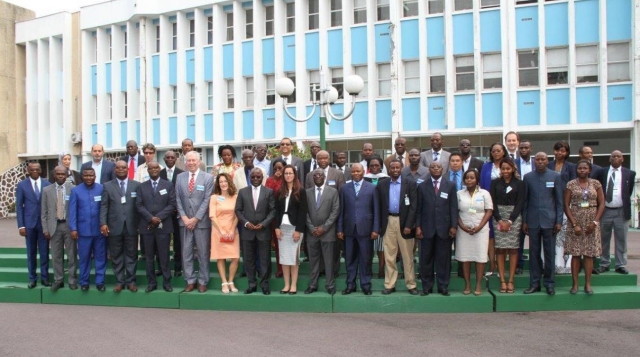Experts wrap up workshop on cancer registries
 Brazzaville 12 February 2016 – Cancer control experts from nineteen French-speaking countries in Africa wrapped up a five-day workshop aimed at building their capacity to tackle the rising tide of cancer in the Region.
Brazzaville 12 February 2016 – Cancer control experts from nineteen French-speaking countries in Africa wrapped up a five-day workshop aimed at building their capacity to tackle the rising tide of cancer in the Region.
The workshop which began on 8 February 2016, in Brazzaville, Congo brought together over forty high-level participants from ministries of health. It was organized by the World Health Organization Regional Office for Africa in collaboration with the International Atomic Energy Agency (IAEA), International Agency for Research on Cancer (IARC), African Cancer Registries Network (AFCRN) and the Registre des cancers de Brazzaville. The objective was to enhance Member States’ capacities in establishing and operating cancer registries to support comprehensive cancer control planning in francophone African countries.
Cancer is a real public health problem that kills many people in the African Region. It is estimated that within 20-30 years, the global number of cancer cases is expected to double and African countries will be the most affected. In addition to preventive efforts, effective cancer control requires major Government commitment to the capacity-building of health care professionals and to the provision of adequate facilities.
The investments in cancer treatment, including radiation medicine, can only be optimized if national capacities are enhanced in areas beyond radiotherapy, such as cancer surveillance, prevention, early detection, diagnosis, surgical and medical oncology, and palliative care. Data collected though population-based cancer registries (PBCR) form the basis for sound and sustainable long-term cancer control planning, monitoring and evaluation.
Speaking at the opening session, chaired by the Minister of Higher Education of Congo, Prof Georges Moyen, Dr Joseph Cabore, Director of Programme Management, on behalf of Dr Matshidiso Moeti, the WHO Regional Director for Africa, urged participants to use the skills and knowledge acquired during the workshop to ensure that population-based cancer registries are fully integrated into national cancer control planning. He noted that the aim of cancer registration is not only to know the incidence but also to identify risk factors, and high-risk groups, to better understand the evolution of the disease.
At the end of the workshop, facilitators commended the participants for their high standard contributions and commitment to combating cancer. The participants strengthened their capacity in using cancer registry data for planning and evaluation of cancer control. They were also equipped with cancer registration methods (data collection, data management, basic analysis etc.) as well as tools for reporting on the cancer burden to stakeholders in support of related decision-making. They also familiarized themselves with concepts and methods of cancer registration and how to fully integrate population-based cancer registries into national cancer control planning.
Commenting on the workshop, Dr Ananga Noa Sidone, Consultant Pathologist at Douala General Hospital, Cameroon, said: “We thank the organizers of this meeting for among other things, strengthening our capacities to use data from cancer registries for cancer control planning.We will make good use of this knowledge.”
____________________________________
For more information, please contact:
Dr Jean-Marie Dangou Regional Adviser - Cancer control, dangoujm [at] who.int (dangoujm[at]who[dot]int), Tel +47-241-39344,
C. Boakye-Agyemang, Regional Communications Adviser, boakyeagyemangc [at] who.int (boakyeagyemangc[at]who[dot]int), Tel +47-241-39420,


